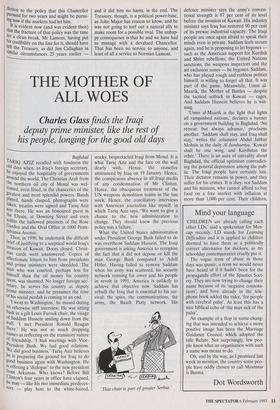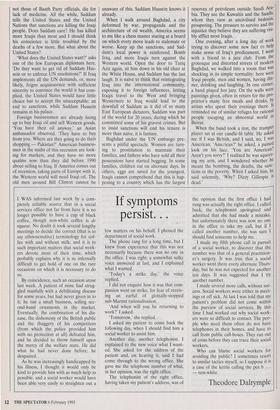THE MOTHER OF ALL WOES
Charles Glass finds the Iraqi
deputy prime minister, like the rest of his people, longing for the good old days
Baghdad TARIQ AZIZ recalled with fondness the old days when, as Iraq's foreign secretary, he enjoyed the hospitality of governments around the world. The Christian Arab from the northern oil city of Mosul was wel- comed, even feted, in the chanceries of the greatest and most splendid powers. Bands Played, hands clasped, photographs were taken, treaties were signed and Tariq Aziz Was there. He was an honoured guest in the Elysee, at Downing Street and even Within the hallowed precincts of the Rose Garden and the Oval Office at 1000 Penn- sylvania Avenue.
Then, in 1990, he undertook the difficult brief of justifying to a sceptical world Iraq's invasion of Kuwait. Doors closed. Christ- mas cards went unanswered. Copies of affectionate letters to him from presidents and prime ministers were shredded. The an who was courted, perhaps less for himself than the oil money his country spent, was shunned. No longer foreign sec- retary, he serves his country as deputy prime minister, and he presumes the time of his social purdah is coming to an end. 'I went to Washington,' he mused during an otherwise stiff interview. He was sitting back in a gilt Louis Farouk chair, the visage of Saddam Hussein smiling down from the wall. 'I met President Ronald Reagan there.' He was not so much dropping names as reflecting on the transitory nature of friendship. 'I had meetings with Vice- President Bush. We had good relations. We did good business.' Tariq Aziz believes he is preparing the ground for Iraq to do good business again with Washington. He is offering a 'dialogue' to the new president from Arkansas. Who knows? Before Bill Clinton's four years in office have elapsed, he may — like his two immediate predeces- sors — play host to the white-haired,
stocky, bespectacled Iraqi from Mosul. It is what Tariq Aziz and the face on the wall dearly wish. Hence, the ceasefire announced by Iraq on 19 January. Hence, the conspicuous absence in all Iraqi media of any condemnation of Mr Clinton. Hence, the obsequious treatment of the UN weapons demolition teams in the last week. Hence, the conciliatory interviews with American journalists like myself, in which Tariq Aziz says, 'We want to give a chance to the new administration to change. They should know the previous policy was a failure.'
What the United States administration under President George Bush failed to do was overthrow Saddam Hussein. The Iraqi government is asking America to recognise the fact that it did not depose or kill the man George Bush compared to Adolf Hitler. Having failed to remove Saddam when his army was scattered, his security network running for cover and his people in revolt in 1991, America is unlikely to achieve that objective now. Saddam has rebuilt the Iraq that is essential to his sur- vival: the spies, the communications, the army, the Baath Party network. His
`That chair is part of greater Serbia.' defence minister says the army's conven- tional strength is 87 per cent of its level before the invasion of Kuwait. His industry minister says Iraq has restored 90 per cent of its prewar industrial capacity. The Iraqi people are once again afraid to speak their minds even in private. Saddam feels secure again, and he is proposing to let bygones such as the American support for Kurdish and Shiite rebellions, the United Nations sanctions, the weapons inspectors and the air exclusion zones — be bygones. Saddam, who has played rough and ruthless politics himself, is willing to forget all that. It was part of the game. Meanwhile, Umm al- Maarik, the Mother of Battles — despite the tactical setback in Kuwait — rages. And Saddam Hussein believes he is win- ning.
`Umm al-Maarik is the light that lights all vanquished nations,' declares a banner on a government building in Baghdad. 'No retreat: but always advance,' proclaims another. 'Saddam shall stay, and Iraq shall stay,' writes the columnist Abdul Jabbar Mohsin in the daily Al Jumhurriya. 'Kuwait shall be one wing, and Kurdistan the other.' There is an aura of unreality about Baghdad, the official optimism contradict- ing the general depression among the pub- lic. The Iraqi people have certainly lost. Their dictator remains in power, and they suffer for his crimes. It is they, not Saddam and his minions, who cannot afford to buy food on a free market with inflation a more than 1,000 per cent. Their children, not those of Baath Party officials, die for lack of medicine. All the while, Saddam tells the United States and the United Nations that sanctions are killing the Iraqi people. Does Saddam care? He has killed more Iraqis than most and I should think his conscience is little troubled by the deaths of a few more. But what about the United States?
`What does the United States want?' asks one of the few European diplomats here. 'Do they want to get rid of Saddam Hus- sein or to enforce UN resolutions?' If Iraq implements all the UN demands, or, more likely, feigns acquiescence with sufficient sincerity to convince the world it has com- plied, the United States would have little choice but to accept the unacceptable: an end to sanctions, while Saddam Hussein remains in his palace.
Foreign businessmen are already lining up to buy Iraqi oil and sell Western goods. `You have their oil anyway,' an Asian ambassador observed. 'They have to buy from you. Where are they going to do their shopping — Pakistan?' American business- men in the midst of this recession are look- ing for markets, and they have no more qualms now than they did before 1990 about selling to Iraq. If America comes out of recession, taking parts of Europe with it, the Western world will need Iraqi oil. The old men around Bill Clinton cannot be unaware of this. Saddam Hussein knows it already.
When I walk around Baghdad, a city deformed by war, propaganda and the architecture of oil wealth, America seems to me like a chess master staring at a board on which every move leads to stalemate or worse. Keep up the sanctions, and Sad- dam's local power is reinforced. Bomb Iraq, and more Iraqis turn against the Western world. Open the door to Tariq Aziz again, sit him down in his old chair at the White House, and Saddam has the last laugh. It is naive to think that reintegrating Iraq into the international community, exposing it to foreign influences, letting Iraqis travel to the West and bringing Westerners to Iraq would lead to the downfall of Saddam as it did of so many East European dictators. Saddam was part of the world for 20 years, during which he committed some of his gravest crimes. But to insist sanctions will end his tenure is more than naïve, it is fantasy.
Baghdad under the UN embargo pre- sents a pitiful spectacle. Women are turn- ing to prostitution to maintain their families, and fathers who have sold all their possessions have started begging. In some families, children eat on alternate days. In others, eggs are saved for the youngest. Iraqis cannot comprehend that this is hap- pening to a country which has the largest
reserves of petroleum outside Saudi Ara' bia. They see the Kuwaitis and the Saudis, whom they view as uncivilised bedouin, prospering. The pressure to survive and the injustice they believe they are suffering visi- bly afflict most Iraqis.
One evening, after a long day of work trying to discover some new fact to help make sense of Iraq's predicament, I went with a friend to a jazz club. From the grotesque and distorted streets of modern Baghdad, we walked into a room that was shocking in its simple normality: here were Iraqi people, men and women, having din- ner, drinking and laughing. In one corner, a band played hot jazz. On the walls were paintings given, often in return for the pro- prietor's many free meals and drinks, by artists who spent their evenings there. It reminded me of similar refuges for rational people escaping an abnormal world in Beirut.
When the band took a rest, the trumpet player sat at our candle-lit table. He asked me if I was British, and I said, no, I was American. 'American?' he asked, a pained look on his face. 'You are American? Aren't you sorry?' I realised he was squeez- ing my arm, and I wondered whether he meant the bombing, the deaths, the sanc- tions or the poverty. When I asked him, he said solemnly, 'Why? Dizzy Gillespie Is dead.'























































 Previous page
Previous page